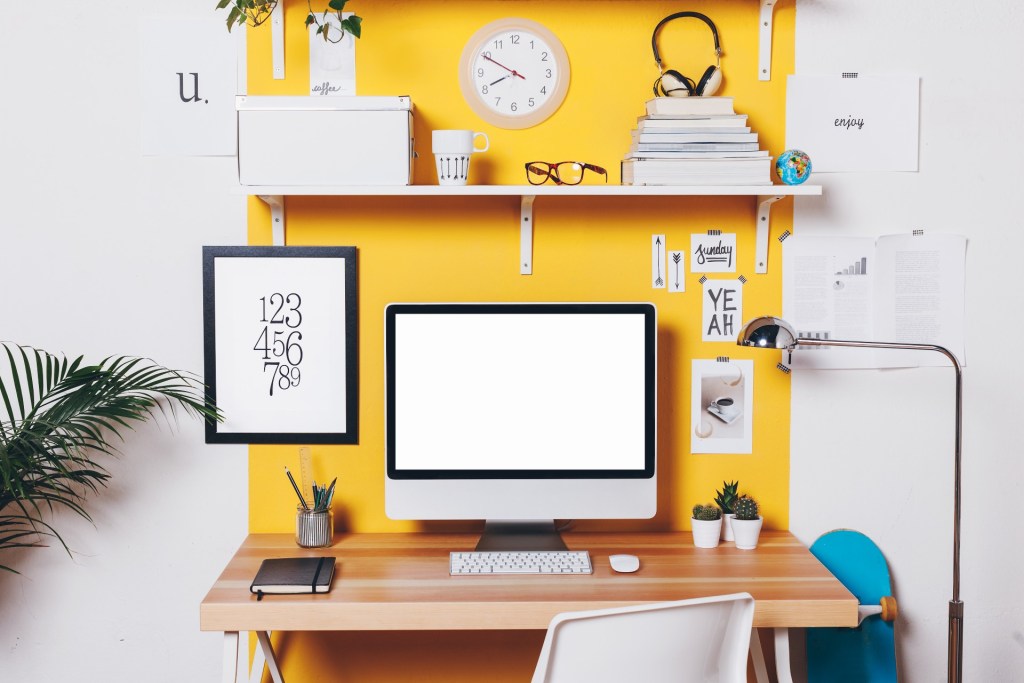More people than ever before are working from home and while you may be saving commuting time and cost and have the option to work in your pajamas, the trade-off has been that your work life has invaded your home space.
Choosing the room for your home office is only the beginning — making the most of the space you have available is the challenge. Whether you have the good fortune of a designated home office or you are sharing a space with other members of your household, it’s important to establish good work habits and practical home office organization. Want to maximize the hours you spend working from home? Getting an organized home office is easy—well, at least easier than you think!

Simple steps to keep your home office organized
A disorganized office can lead to a less productive workday. With a few office supply essentials, a new perspective, and some minor room layout changes, you can conquer the clutter and kick your workday into overdrive.
- Clean your desk: Limit the number of items you keep on your desk. Stick to a small number of real workday essentials: your laptop and monitor, current files/projects, a notepad, and your appointment book or calendar.
- Use drawer organizers: Eliminate cluttering inside desk drawers by adding plastic drawer organizers. So simple yet so effective; see-through organizers keep office essentials in designated compartments, giving you easy access to paper clips, sticky notes, markers, and more while also making sure no clutter is obscured.
- Set a sorting alarm: Don’t allow paperwork and files to build up on your desk! Institute a ‘no-paper policy’ for your notes and get in the habit of entering appointments, notes, and deadlines directly into your planner, computer, or phone at the end of every workday
- Have trouble remembering to put things away? Set an alarm on your phone or computer—once at lunchtime and again at the standard end of your workday—to remind you that it’s time for a quick paper and file clean-up.
- Separate your files: Organize files into two basic groups: Active and inactive. Active files should be readily available on your desk during your workday and placed into a multi-level tray at the corner of your desk. Inactive files go into filing cabinets or labeled storage boxes.
- Sticky notes are your friend: Sticky notes on walls are a great way to remind you of important daily deadlines, appointments, and phone numbers you haven’t had a chance to input into your phone. Peel them off at the end of the day, and no one will even know they were there.
- Create a printing station: Keep your printer, scanner, and printing supplies all together in a designated shelf or cabinet. Taking your printer off your desk gives your more space to work and keeps your office looking neater and less cluttered.

Make the most of your space with these storage hacks
Sometimes you have to make the most of the space above and beyond your desk…literally!
- Don’t forget your walls: Walls can hold shelves, hanging filing systems, whiteboards, and more. When you ‘go vertical,’ you instantly up your office space while keeping your desk clean and clutter-free.
- Add a wall calendar: Use a wall calendar to provide instant visual reminders of your planning needs and goals for the day, week, and month. Checking items off as they are completed provides a sense of accomplishment.
- Pin it: Corkboards are a great organizing resource for your home office: Pin important projects, phone numbers, and deadline reminders within easy view. Tacks allow for easy swapping out of pinned items as needed. Pin inspirational clippings and personal notes that help motivate and inspire you.
- Don’t forget the space under your desk: If the space under your desk can accommodate it, add a small chest of drawers or filing cabinets beneath. You’ll add extra (and almost invisible) storage without taking up additional floor space.
 Keep a home office organized in a shared space
Keep a home office organized in a shared space
Not everyone has the luxury of a dedicated and private home office space. If you share a workspace with your spouse, roommate, or even with your children who are remote learning, it becomes even more important to keep your space as defined and organized as possible.
- Designate individual work zones, and try to keep your supplies and equipment on your side.
- Always keep your side of the room or shared desk clean.
- Wear headphones while listening to audio or video presentations.
- Move to another room when taking phone calls if possible. If there isn’t another space for handling calls, avoid using the speaker function.
While working in a remote environment, it’s crucial to maximize your workplace’s space and efficiency. Getting—and staying—organized requires discipline, a few office supply store essentials, and establishing good workplace habits. In the end, the result will be a more inspiring workplace and a more productive workday.
 Keep a home office organized in a shared space
Keep a home office organized in a shared space


